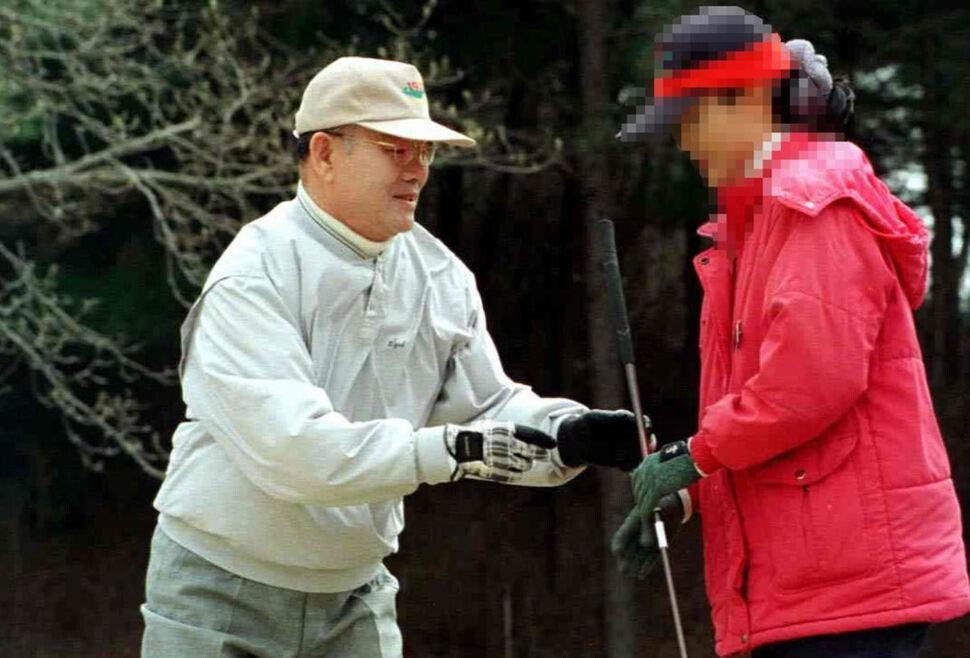hankyoreh
Links to other country sites 다른 나라 사이트 링크
Chun Doo-hwan accompanied by police security guards on golf course

Ex-president Chun Doo-hwan, 88, was accompanied for four police security guards and two police cars when he golfed at a Gangwon Province course (identified by the initial “K”) on Dec. 6, it has been learned.
According to information received from the National Police Agency (NPA) on Jan. 18 by Democratic Party lawmaker Lee Jae-jung of the National Assembly Public Administration and Security Committee, a total of two vehicles and four security guards were assigned to Chun on Dec. 6, including one superintendent and three lieutenants. Chun is normally guarded by five police officers at a time. One of the five appears to have stayed behind at his home in Seoul’s Yeonhui neighborhood while the other four went with Chun to golf course K.
According to information on Chun’s security personnel situation acquired by Lee from the NPA during an Oct. 2018 parliamentary audit, five police officers guard Chun personally while 78 auxiliary police guards patrol his home and the nearby residence of fellow ex-president Roh Tae-woo.
Chun was previously referred for trial on charges of defaming the late Catholic priest Cho Pius after the latter’s accounts of gunfire from helicopters during the Gwangju Democracy Movement in May 1980. But Chun did not attend two hearings in Aug. 2018 and on Jan. 7, purportedly because he was suffering from the flu and the effects of Alzheimer’s disease. Criticism has been mounting since revelations that he was seen playing golf at course K around the same time he was declining to attend his trial. Calls to discontinue his security and other “honorable treatment” as a former president are also expected to gain further traction.
According to the Presidential Security Service Act, the Presidential Security Service (PSS) may guard a former president for up to 10 years, with the option of extending the period for five years if necessary. In Chun’s case, the full period has elapsed, and he does not receive PSS protection. But he does continue to receive security services from the police, as the Honorable Treatment of Ex-Presidents Act states that former presidents may receive security assistance “when necessary.”
Over 200 million won (US$177,652) in taxpayer money is spent each year to guard Chun. In a Nov. 2017 meeting of the National Assembly Public Administration Security Committee’s budget/accounts and fund review subcommittee, the then-director of the NPA security division explained, “If we adopt the standard of the average 43.5 million won [US$38,639] per capita annual pay of police personnel, a total of 435 million won [US$386,393] is being spent on the former president Chun Doo-hwan.”
As the number of police personnel guarding Chun was reduced from ten at the time to five as of Jan. 2018, the amount currently being spent is estimated at around 220 million won (US$195,417). Around 35 million won (US$31,089) a year is also spent on maintaining police facilities and equipment – which translates into a combined total of over 250 million won (US$222,065) annually.
Critics are questioning whether taxpayer money should continue to be spent when Chun engages in actions seen as unbecoming for a former president.
“It is impossible to comprehend police security services being mobilized for Chun Doo-hwan to play golf, when he is a historical criminal who has failed to pay over 100 billion won [US$88.83 million] in penalties,” said Lee Jae-jung.
“Given how feeble the [legal] basis is, the security services should be suspended immediately,” she insisted.
By Jung Hwan-bong and Yi Ju-been, staff reporters
Please direct comments or questions to [english@hani.co.kr]

Editorial・opinion
![[Column] Welcome to the president’s pity party [Column] Welcome to the president’s pity party](https://flexible.img.hani.co.kr/flexible/normal/500/300/imgdb/original/2024/0515/3917157400447943.jpg) [Column] Welcome to the president’s pity party
[Column] Welcome to the president’s pity party![[Editorial] Korea must respond firmly to Japan’s attempt to usurp Line [Editorial] Korea must respond firmly to Japan’s attempt to usurp Line](https://flexible.img.hani.co.kr/flexible/normal/500/300/imgdb/original/2024/0514/2317156736305813.jpg) [Editorial] Korea must respond firmly to Japan’s attempt to usurp Line
[Editorial] Korea must respond firmly to Japan’s attempt to usurp Line- [Editorial] Transfers of prosecutors investigating Korea’s first lady send chilling message
- [Column] Will Seoul’s ties with Moscow really recover on their own?
- [Column] Samsung’s ‘lost decade’ and Lee Jae-yong’s mismatched chopsticks
- [Correspondent’s column] The real reason the US is worried about Chinese ‘overcapacity’
- [Editorial] Yoon’s gesture at communication only highlights his reluctance to change
- [Editorial] Perilous stakes of Trump’s rhetoric around US troop pullout from Korea
- [Guest essay] Preventing Korean Peninsula from becoming front line of new cold war
- [Column] The state is back — but is it in business?
Most viewed articles
- 1[Column] Welcome to the president’s pity party
- 2[Editorial] Transfers of prosecutors investigating Korea’s first lady send chilling message
- 3Could Korea’s Naver lose control of Line to Japan?
- 4[Editorial] Korea must respond firmly to Japan’s attempt to usurp Line
- 5Major personnel shuffle reassigns prosecutors leading investigations into Korea’s first lady
- 6Second suspect nabbed for gruesome murder of Korean in Thailand, 1 remains at large
- 7Korea cedes No. 1 spot in overall shipbuilding competitiveness to China
- 8[Column] Will Seoul’s ties with Moscow really recover on their own?
- 9US has always pulled troops from Korea unilaterally — is Yoon prepared for it to happen again?
- 10[Correspondent’s column] The real reason the US is worried about Chinese ‘overcapacity’